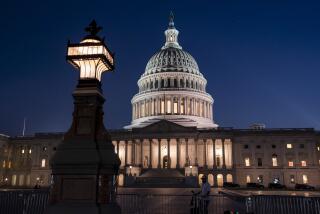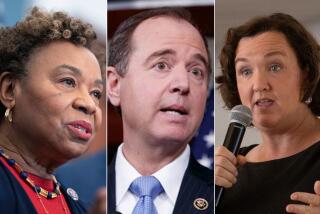Senate OKs ban on the use of taxpayer funds in bailing out banks
- Share via
WASHINGTON — The Senate, opening debate Wednesday on amendments to the sweeping overhaul of Wall Street regulation, adopted a bipartisan compromise establishing new procedures for averting another financial meltdown like the 2008 crisis.
On a 96-1 vote, the Senate adopted an amendment by Sen. Barbara Boxer (D-Calif.) declaring that no taxpayer funds would be used to shore up failing financial institutions in the future.
The Senate also adopted, 93 to 5, a bipartisan compromise that dropped a proposed $50-billion fund to cover costs of liquidating failing firms -- a fund that would have been financed by banks. Critics said the fund’s existence would encourage future bailouts rather than prevent them.
With the adoption of those amendments -- the first since the bill arrived on the Senate floor last week -- the way was cleared for what is expected to be at least a week of debate on even more contentious issues.
Republicans want to scale back the bill’s proposal to establish a bureau within the Federal Reserve to focus on consumer protection in investments and finance. Critics, backed by a ferocious lobbying campaign, also hope to change the bill’s strict new rules and transparency requirements for derivatives, the complicated financial contracts that were a big part of the Wall Street meltdown.
But before turning to those issues, both parties wanted to address Republicans’ charges that the bill did not do enough to close the door on future government bailouts. Dodd said those complaints were unfounded but said Boxer’s amendment would put an “exclamation point” on the bill’s intent.
Boxer, who is cutting a populist profile in her reelection campaign this year, said, “If there’s one thing we should all be able to agree on, it is this: The American taxpayers should never again have to bail out Wall Street firms that gambled away our savings and wreaked havoc on our economy.”
The one senator to oppose Boxer’s amendment was Tom Coburn (R-Okla.).
Republicans insisted on further guarantees, which were included in the compromise agreed to by Dodd and Sen. Richard C. Shelby of Alabama, ranking Republican on the banking committee.
The five voting against that amendment were four Republicans -- Coburn, John Cornyn of Texas, Jim DeMint of South Carolina and Orrin G. Hatch of Utah -- and one Democrat, Byron L. Dorgan of North Dakota.
The major change was the elimination of the $50-billion fund that would have been paid into by financial institutions to cover costs to the government if it seized and dismantled any large financial firm on the brink of bankruptcy.
The financial industry strongly opposed the fund, as did Shelby and other Republicans, who contended that having such a fund in place would make it easier to bail out companies in the future or to divert the money to other uses.
The House version of the legislation contains a $150-billion prepaid fund.
--
More to Read
Get the L.A. Times Politics newsletter
Deeply reported insights into legislation, politics and policy from Sacramento, Washington and beyond. In your inbox three times per week.
You may occasionally receive promotional content from the Los Angeles Times.












